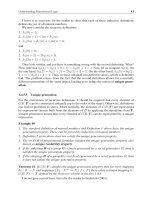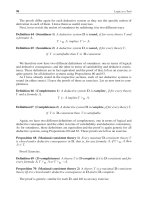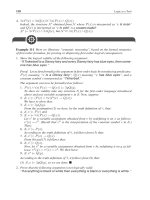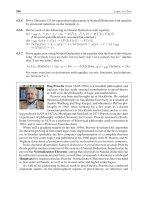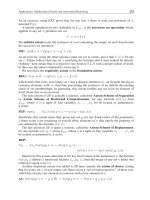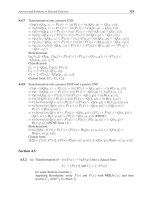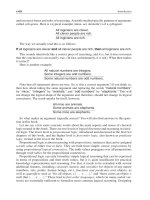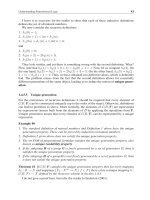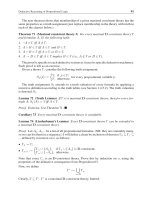Logic as a tool a guide to formal logical reasoning ( PDFDrive ) 114
Bạn đang xem bản rút gọn của tài liệu. Xem và tải ngay bản đầy đủ của tài liệu tại đây (68.46 KB, 1 trang )
90
Logic as a Tool
The proofs differ again for each deductive system as they use the specific notion of
derivation in each of them. I leave them as useful exercises.
Next, let us revisit the notion of soundness by redefining it in two different ways.
Definition 64 (Soundness 1) A deductive system D is sound1 if for every theory Γ and
a formula A,
Γ D A implies Γ |= A.
Definition 65 (Soundness 2) A deductive system D is sound2 if for every theory Γ,
if Γ is satisfiable then Γ is D-consistent.
We therefore now have two different definitions of soundness: one in terms of logical
and deductive consequence, and the other in terms of satisfiability and deductive consistency. These definitions are in fact equivalent and the proof of that, left as an exercise, is
quite generic for all deductive systems using Propositions 60 and 63.
As I have already stated in the respective sections, each of our deductive systems is
sound (in either sense). I leave the proofs of these as exercises. Let us now turn to completeness.
Definition 66 (Completeness 1) A deductive system D is complete1 if for every theory
Γ and a formula A,
Γ |= A implies Γ D A.
Definition 67 (Completeness 2) A deductive system D is complete2 if for every theory Γ,
if Γ is D-consistent then Γ is satisfiable.
Again, we have two different definitions of completeness, one in terms of logical and
deductive consequence and the other in terms of satisfiability and deductive consistency.
As for soundness, these definitions are equivalent and the proof is again generic for all
deductive systems, using Propositions 60 and 63. These proofs are left as an exercise.
Proposition 68 (Maximal consistent theory 1) Every maximal D-consistent theory Γ
is closed under deductive consequence in D, that is, for any formula A, if Γ D A then
A ∈ Γ.
Proof: Exercise.
Definition 69 (D-completeness) A theory Γ is D-complete if it is D-consistent and for
every formula A, Γ D A or Γ D ¬A.
Proposition 70 (Maximal consistent theory 2) A theory Γ is a maximal D-consistent
theory iff it is closed under deductive consequence in D and is D-complete.
The proof is generic, similar for each D, and left as an easy exercise.
